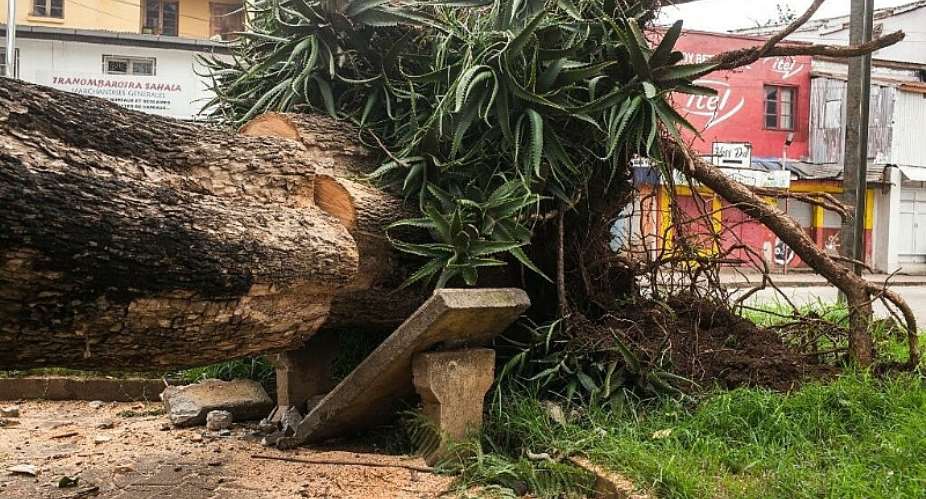Cyclone Batsirai swept out of Madagascar on Monday morning, leaving 20 dead, displacing 55,000 and devastating the drought-hit island's agricultural heartland. Just two weeks after another tropical storm claimed 55 lives, the UN fears a worsening humanitarian crisis.
Cyclone Batsirai swept inland late on Saturday, pounding the eastern coastline with heavy rain and wind speeds of 165 kilometres per hour.
Madagascar's office of disaster and risk management said that Batsirai had left 20 people dead and forced 55,000 from their homes.
"We saw only desolation: uprooted trees, fallen electric poles, roofs torn off by the wind, the city completely under water," said Nirina Rahaingosoa, a resident of Fianarantsoa, 420 km south of the capital.
The UN's children's agency Unicef warned that many of the victims were likely to be children, which make up more than 50 percent of the country's population.
The cyclone first hit a sparsely populated agricultural area in the country's east on Saturday, before weakening. It then moved west inalnd, causing flooding that ravaged rice fields in the country's central "breadbasket", Unicef said.
"The imapct of the cyclone does ont end today, it will last for several months, particularly the impact on agriculture," Jean Benoit Manhes, a Unicef representative said.
The damage from the storm compounded the destruction wreaked by Cyclone Ana, which hit the island two weeks ago, killing 55 people and displacing 130,000.
'City almost 95 percent destroyed'
Willy Raharijaona, technical adviser to the vice president of Madagascar's Senate, said some parts of the southeast had been cut off from the surrounding areas by flooding.
"It's as if we had just been bombed. The city of Nosy Varika is almost 95 percent destroyed," he said. "The solid houses saw their roofs torn off by the wind. The wooden huts have for the most part been destroyed."
Some 77 percent of Madagascar's population live below the poverty line and the latest blow comes during a severe drought in the south which has plunged more than a million people into acute malnutrition, some facing famine.
The cyclone partly destroyed the main road linking the island's north and south, "which will make it difficult to provide access and reinforcements to villages, including in drought-hit areas," Manhes said.
"Madagascar is in a constant humanitarian crisis," he added.
Reunion island power cuts
France's weather service had earlier predicted Batsirai would pose a "very serious threat" to Madagascar, after passing Mauritius and drenching the French island of La Reunion with torrential rain.
Some 10,000 people on Reunion island were still without electricity on Sunday, three days after Batsirai passed through the island, injuring 12 people on its path.
The World Food Programme, citing estimates from national authorities, said around 595,000 people could be directly affected by Batsirai, and 150,000 more might be displaced because of new landslides and flooding.
The storm poses a risk to at least 4.4 million people in total, the International Federation of Red Cross and Red Crescent Societies said.
Global warming has increased the risk of flooding and tropical storms, as the atmosphere retains more water and rainfall patterns are disrupted.
South Africa's President Cyril Ramaphosa told a summit of African leaders meeting in Addis Ababa on Sunday that the continent was "experiencing the worst impacts of phenomena associated with global warming such as droughts, floods and cyclones".
(with newswires)





 Avoid pre-registered SIMs, buyer and seller liable for prosecution – Ursula Owus...
Avoid pre-registered SIMs, buyer and seller liable for prosecution – Ursula Owus...
 Election 2024: Mahama has nothing new to offer Ghanaians, Bawumia is the future ...
Election 2024: Mahama has nothing new to offer Ghanaians, Bawumia is the future ...
 OSP files fresh charges against ex- PPA Boss
OSP files fresh charges against ex- PPA Boss
 Withdraw unreasonable GH¢5.8m fine against former board members – ECG tells PURC
Withdraw unreasonable GH¢5.8m fine against former board members – ECG tells PURC
 Akroma mine attack: Over 20 armed robbers injure workers, steal gold at Esaase
Akroma mine attack: Over 20 armed robbers injure workers, steal gold at Esaase
 Those who understand me have embraced hope for the future — Cheddar
Those who understand me have embraced hope for the future — Cheddar
 Ghana will make maiden voyage into space should Bawumia become President — Chair...
Ghana will make maiden voyage into space should Bawumia become President — Chair...
 Train crash: Despite the sabotage, we shall not be deterred and will persevere —...
Train crash: Despite the sabotage, we shall not be deterred and will persevere —...
 Tema-Mpakadan railway project a perversion of the original viable concept design...
Tema-Mpakadan railway project a perversion of the original viable concept design...
 Train crash: Elsewhere, everyone involved in the test will either be fired or re...
Train crash: Elsewhere, everyone involved in the test will either be fired or re...
